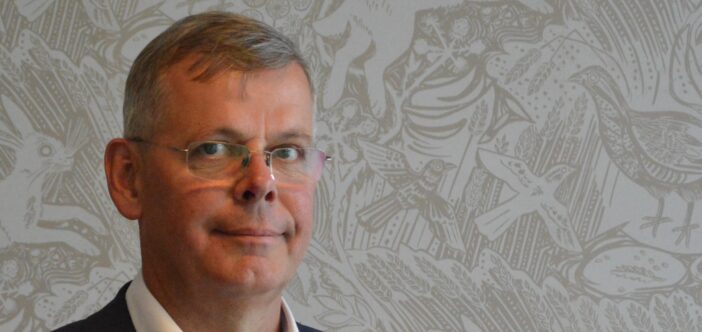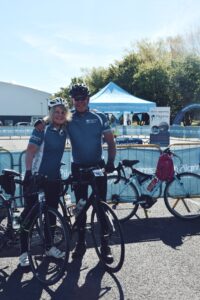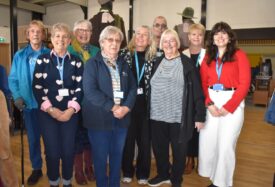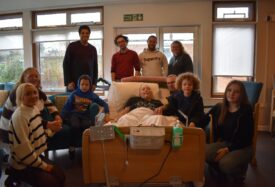Trustees Week 2025: Celebrating the contribution of Pilgrims Hospices volunteer board members

As part of Trustees’ Week, Pilgrims Hospices is celebrating the contribution of its volunteer board members who help guide and strengthen the charity’s work across east Kent.
Simon Perks, who retired from Pilgrims Hospices Board of Trustees at the end of September 2025 after 11 years of service, reflects on his time with Pilgrims, sharing personal insights about the challenges and achievements that have shaped both his journey and the hospice’s.
What inspired you to become a trustee of Pilgrims Hospices?
It was not so much that I was inspired; rather, another trustee asked me if I would join – these were the days before applications and interviews (I hasten to add that the introduction of these is a very good thing!). I was in full-time work and don’t feel, regrettably, that I was able to give the time to being a trustee that was really needed. This probably says more about my time management than anything else. While I hope my input was of some benefit during that time, in the five years I have been retired it has been a real joy to be able to get more involved.

How has your perspective of hospice care evolved during your time as a trustee?
Having spent my working life in the NHS, I am ashamed to admit that I now realise how little I knew about hospice care, and specifically the importance of hospices being independent of the NHS. That independence, although sometimes financially challenging, gives the hospice a creativity and flexibility that I had not anticipated. Its charitable status also fosters a commitment from staff and a connection with the community that it serves that should always be cherished.
Is there a particular moment or achievement that stands out for you during your time as a trustee?
Not specifically, but there are two changes that I have observed that I believe are important. The first is the way the running of the hospice is organised. This may sound rather dry and managerial, but the way the hospice runs its affairs has been considerably strengthened in recent years. The benefits are clear; for example, the hospice is in a much stronger financial position (despite all the pressures that everyone is facing) than it has been for many years.
Further, the hospice has built on its scope and expertise to develop innovative care programmes such as Think, Talk, Act that directly address long-standing unmet needs of both patients and their families.
What will you miss most about being involved with the hospices?
Working in the NHS, I literally met thousands of doctors, nurses and support staff of all kinds over the years. The dedication, commitment, resourcefulness, creativity and compassion that I have consistently witnessed among Pilgrims staff is quite exceptional. I only regret not having been involved in more ‘Board Walks’ over the years; I always met inspirational people doing wonderful things in their daily work.
What advice would you give to hospice leaders and trustees about navigating future changes in the sector?
I have always believed that the patients, families and friends that Pilgrims care for, and support, are best served by the hospice working really closely with other care organisations and partners. This includes not only local NHS and social services, but also other hospices in Kent.
The hospice’s services will have their widest impact if Pilgrims is clearly a key partner with every agency involved in a person’s end-of-life care. Also, we have knowledge and expertise that others can learn from, and we should be able to share this as widely as possible. Much has been achieved in meeting these aims, and I am sure they remain key to successfully navigating future changes.
If you could change one thing about the way hospices are supported or funded, what would it be?
The fact that so much of the hospice’s work is funded by the generosity of the people of east Kent, whom Pilgrims serves, is a vital part of what makes Pilgrims so important to the community. Having said this, we have tried to increase the money Pilgrims receives from the NHS for the services it provides, and I hope that funding will increase in the future.
What message would you like to leave for trustees, staff, volunteers, and supporters of the hospice?
I know in the thick of the daily work routine, whether you work in an office, on the wards or in people’s homes, it can sometimes feel tough. But what I hope every single person working with Pilgrims – whether paid staff, volunteer, or even trustee – can always hold onto is that they are making a difference every single day and what they do really matters. I know this because, as many of us will have experienced, I talk to neighbours and friends whose lives have been touched by the work of Pilgrims Hospices.
And finally, you have been an active supporter of our challenge events. Will we still see you at future events?
Definitely. My wife Gill and I have already signed up for the Santa run; this will be our third time, and I hope I don’t lose my Santa trousers halfway round as I have before! We also both took part in the annual Cycle Challenge in May this year, completing 50 miles; we’re hoping to do the 75-mile route in 2026.
These are excellent events, so well organised, really sociable and a great way to support Pilgrims.


